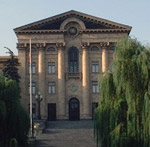Even though after the visit of the PACE co-rapporteurs to Armenia the authorities are happy and show that they don’t have any problems with the EU, the conversation between them and the co-rapporteurs is strictly confidential. According to our sources of information, the co-rapporteurs have put a condition that till March 1, i.e. the opposition rally, all political prisoners, specifically the prisoners charged under the Case of Seven, shall be set free.
If before the visit of the co-rapporteurs the coalition representatives thought that Armenia will lose the voting right, now they don’t think so. Now they are saying the vice versa, they say that they have settled the accounts with the EU, but they don’t provide any details. After the visit of the co-rapporteurs every day the parliamentary commission on state and legal affairs organizes close discussions. The reason is the fact that the authorities have promised to amend Article 300 of the criminal code. Since the co-rapporteurs left Davit Harutyunyan is reading the criminal code all day long (as his colleagues say). The problem is that the co-rapporteurs demand from the Armenian government to send them a draft law by January 26, which would prove them that the political prisoners will be released upon adoption of that draft law (specifically the political prisoners charged under the Case of Seven). According to our information, during the meetings with representatives of the Armenian government the co-rapporteurs said that they don’t trust the verbal promises of the Armenian government any more and that hence they will accept the promises of the Armenian government in written form. The EU co-rapporteurs feel that they have problems with the Armenian opposition and society as well and definitely have decided to find a solution which would satisfy both the opposition and society. This is the reason why they have told the government to release the political prisoners by March 1 by all means. Thus, during these days Davit Harutyunyan is busy with formulating the promise of the Armenian authorities in written form. The authorities want to keep that information in secret in order not to “spoil the deal”, i.e. in order not to let the opposition criticize the EU and not to make noise. This was one of the reasons why the co-rapporteurs escaped from the answers of journalists while being in Armenia. Their only demand was amending Article 300 because they say that it is very general and leaves space for misinterpretation. It means that it should be specified correctly which actions are considered as attempt to usurp the power. Of course the authorities said that they could not release all oppositionists or politicians who were directly connected with weapons. According to our information, the co-rapporteurs said that if there were such justifications and proofs, Armenia would not have any problems with the EU connected with it (however we were not informed whether the co-rapporteurs have asked them that if there were such proofs why they had not brought up those proofs during the past ten months).
It is not clear yet how the authorities and the ad hoc commission launched in the parliament confidentially are going to deal with this issue and amend the criminal code. There are rumors in the parliament saying that the law should be amended in a manner not to consider people as attempting to usurp the power but making hooliganism during rallies, which does not mean that they have tried to usurp the power through violence. In other words, the authorities have to regret and show that they really regret, which shall be done through amending the article 300 and releasing the political prisoners.
We asked Armenian National Congress representative Levon Zurabyan whether after amending the article 300 their friends will stop being considered political prisoners, in answer to which he said, “Their status of being political prisoners is not connected with the interpretation of the article 300 at all. Neither the amended or any other law can assign a crime to the accused persons under the Case of Seven and other political prisoners. If the authorities think that only the people charged under the article 300 are considered political prisoners, they should be more cautious. Those people are political prisoners because the administration and prosecutor’s office have charged them under fake accusations. Even if as a result of March 1 events they are charging people for failing to pay taxes, it does not change anything either and such people are considered political prisoners.”

